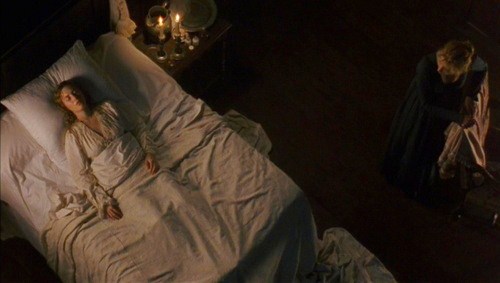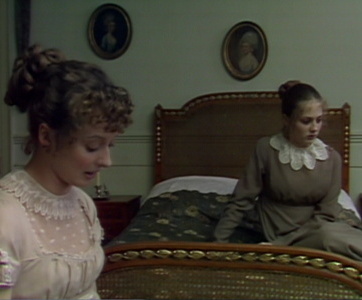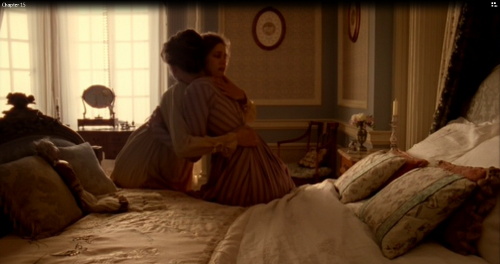|
I have a TOR edition of Sense and Sensibility (I traded a student an ordinary Penguin edition for it) with the following description of the novel on the cover: “Two sisters. Two romances. A tragic tale of love and deceit . . .” (ellipsis in the original). As breathless as this prose may be, the marketers get the point exactly right—two sisters take precedence over the two romances. What matters most in Sense and Sensibility to all concerned—Austen, readers, and characters—is the relationship between Elinor and Marianne. Indeed, from this perspective, Edmund and Colonel Brandon are, for all intents and purposes, extraneous—mere devices or conventional engines to resolve the plot. What matters most is the sororal bond, and the happy ending is predicated on Elinor and Marianne’s living next door to one another, close, dependent, and content. Romantic attachment between men and women—marriage—is overshadowed by the emotional satisfaction of sisterly bonds. If readers, that is to say, my students, regularly complain that neither Edward nor Colonel Brandon is especially appealing or distinctive or active, I argue that this deficiency does not matter because the pleasures of the narrative are all invested in the connection between Elinor and Marianne, a connection that is tried and threatened, but eventually restored and strengthened across the narrative.
More than any other Austen novel, Sense and Sensibility unfolds within the tight confines of family, a structure so small, tight, and female here that two concluding marriages appear less exogamous than the mere absorption of two minor, additional members. All of the crises and turns of the plot revolve around the two sisters—rejection, estrangement, illness, and reconciliation. The almost classical recognition scene that underscores the novel’s didactic burden is Marianne’s powerful acknowledgment of her sister’s moral superiority (344-47). It is worth noting that in their 1995 film of the of novel director Ang Lee and screenwriter Emma Thompson set this scene in an unparalleled vista of downs and bay, the most far-reaching, panoramic view in the whole film. We might also note that when Lee resorts to his signature overhead shot, it always frames sororal burden and care: Elinor with the rejected teacup for Marianne or Elinor grieving over her “dearest” sister’s sickbed. Lee and Thompson are just emphasizing what I am arguing readers have always known about this novel—that Austen directs our investment towards the bond between the two sisters, and every other relation in the text is secondary. Theirs are the scenes that are charged with emotion.
From first to last, from the juvenilia to Sanditon, Austen is always playing with the conventions of romance, but Sense and Sensibility is her most unusual version of the romance between sisters. While I would not claim that this novel reflects the strength of the attachment between Jane and Cassandra, I would argue that in the larger context of eighteenth-century English fiction, from early works by Aphra Behn, Manley, and Heywood up to Defoe’s Moll Flanders and Roxana to Fielding’s Joseph Andrews, Tom Jones, and Amelia, through Richardson’s Pamela, Clarissa and Sir Charles Grandison, and on up through the novels of Frances Burney, Charlotte Smith, Maria Edgeworth, and Ann Radcliffe, the presence of strong sororal bonds is rare to the point of non-existence in previous fiction. Indeed the only significant sister that I can think of across eighteenth-century English fiction is Arabella, Clarissa Harlowe’s wicked, jealous, and violent sister from Richardson’s 1751 masterpiece (much like the jealous and violent sister Lady Davers in Pamela). For both male and female novelists, heroines are orphaned or otherwise isolated in order to place them in circumstances in which they have to prove their character and self-reliance. Austen, however, deliberately rejects the hoary orphaning routine in order to explore the significance of family in general. Indeed she actively makes fun of the orphaning routine in Emma, both in making the handsome, clever, and rich Emma her protagonist, over the more conventional choice of the worthy, but penniless and orphaned Jane Fairfax, and in Emma’s fantasies of Harriet’s origins, which of course turn out to be quite prosaic: “She proved to be the daughter of a tradesman, rich enough to afford her the comfortable maintenance which had ever been her’s, and decent enough to have always wished for concealment” (481-82). Most particularly in Sense and Sensibility, she employs family to demonstrate the overriding significance of sisterly affection and interdependence.
It is then strikingly innovative for Austen even to include sisters in a domestic novel where they are usually peripheral at best, or at worst impediments to heroine’s achievement of her goal. Think of Frances Burney’s first novel Evelina, for example, in which the heroine acquires a “sister,” at the very end of the novel—her half-brother’s new wife. There are sisters in Camilla, but they are not central; again Burney has to remove her protagonist from a sensible and caring family in order to generate her complications and her plot—that is, in order to get her into trouble. In arguing that over the course of the century, eighteenth-century novels display a gradual “movement toward plots based on the dynamics of affiliation rather than of power,” Patricia Meyer Spacks observes that “What [Evelina] does express, more intensely than any fictional protagonist before her, is an overwhelming desire for intimate human connection, a desire so profound that it can become an effective agent of plot” (115, 140). While I don’t wish to revive the old claim that Austen completes and improves on Burney by tempering her fantastical plots, it is nonetheless easy to see that in Sense and Sensibility, Austen explores this desire for intimate human connection without romance conventions—mysterious half brothers, infants stolen by gypsies, or the ever-popular strawberry birthmark.
What is truly innovative about Sense and Sensibility is its founding assertion that affiliation does not necessarily need to be found or forged—it needs to be understood, valued, and maintained. As Philip Slater observes about modern concepts of individuation, “The notion that people begin as separate individuals, who then march out and connect themselves with others, is one of the most dazzling bits of self-mystification in the history of the species” (qtd. in Stone 683). Instead of a romance in which the heroine journeys out in search of adventures that will yield marriage and a husband, Austen’s first published novel is in fact a romance about maintaining and repairing the family into which her protagonists are born. While it is true that the vast majority of marriages in Austen and the families they engender are deeply flawed—from the Bennets and the Prices to the Elliots—and it is also true that Austen is unusually clear-eyed and unsentimental about family attachments, nonetheless, she always insists on the claims of and responsibilities to family. From heroines such as Elinor, Fanny, and Anne, who understand these duties from the start, to those such as Elizabeth and Emma, who must learn them in the end, they all without exception affirm familial ties.
Nowhere is this concept of endogamous ties of affiliation more forcefully put than in Mansfield Park where Fanny is reunited with her beloved brother William. This long but striking passage is worth quoting in full, one enormously long, paratactic, concatenated, anaphorisitic sentence:
Excepting the moments of peculiar delight, which any marked or unlooked-for instance of Edmund’s consideration of her in the last few months had excited, Fanny had never known so much felicity in her life, as in this unchecked, equal, fearless intercourse with the brother and friend, who was opening all his heart to her, telling her all his hopes and fears, plans, and solicitudes respecting that long thought of, dearly earned, and justly valued blessing of promotion—who could give her direct and minute information of the father and mother, brothers and sisters, of whom she very seldom heard—who was interested in all the comforts and all the little hardships of her home, at Mansfield—ready to think of every member of that home as she directed, or differing only by a less scrupulous opinion, and more noisy abuse of their aunt Norris—and with whom (perhaps the dearest indulgence of the whole) all the evil and good of their earliest years could be gone over again, and every former united pain and pleasure retraced with the fondest recollection. (234)
In this extraordinary celebration of solidarity between brother and sister, Fanny’s history of isolation and abuse at Mansfield Park is all but rectified through intimate communication with her brother. The single sentence summarizes all of Fanny’s and William’s past experience and hopes for the future, experiences that become immeasurably more valuable by virtue of the telling to a beloved sibling. The narrator goes on to abstract the core value of this intimate consanguinity, implicitly contrasting Price and Bertram sibling:
An advantage this, a strengthener of love, in which even the conjugal tie is beneath the fraternal. Children of the same family, the same blood, with the same first associations and habits, have some means of enjoyment in their power, which no subsequent connections can supply; and it must be by a long and unnatural estrangement, by a divorce which no subsequent connection can justify, if such precious remains of the earliest attachments are ever entirely outlived. Too often, alas! it is so. Fraternal love, sometimes almost every thing, is at others worse than nothing. (234-35)
Only the first half of this paragraph exhibits any sign of Free Indirect Discourse, for we know that only Fanny could maintain that her absent brothers and sisters preserve any interest in the goings on at Mansfield Park. But if we’re tempted to account for the priority of fraternal over the conjugal, which follows, note that the second half is rendered in the narrator’s more abstract and distant voice, so this is not one of Fanny’s effusions. It might be broken or tempered, but in the best of circumstances, Austen says flatly, brothers and sisters have the strongest natural human ties, a relation which Ruth Perry argues had been steadily eroding across the period. It is worth noting here that in ranking fraternal over conjugal attachment, the narrator says absolutely nothing about maternal or paternal attachments—they are not even in the running.
Mansfield Park falls almost twenty years later than the composition of Sense and Sensibility, but sororal and fraternal ties motor both. They underlie the most dramatic and affective moments in the text: Marianne’s confrontation with Elinor, beginning “‘How long has this been known to you’” (262 ff.); Elinor’s sickbed vigil (310 ff.); and Marianne’s reconciliation (344 ff.). I don’t mean to deny that there are not other dramatic moments—the final encounter between Willoughby and Elinor comes to mind. But the action and the emotional structure of Sense and Sensibility, I am arguing, are plotted along the connection between Elinor and Marianne—their differences and divisions, the threats to their bonds, and their reconciliation. Consider this passage, describing Elinor’s pleasure in Marianne’s recovery:
Elinor could not be cheerful. Her joy was of a different kind, and led to any thing rather than to gaiety. Marianne restored to life, health, friends, and to her doating mother, was an idea to fill her heart with sensations of exquisite comfort, and expand it in fervent gratitude;—but it lead to no outward demonstrations of joy, no words, no smiles. All within Elinor’s breast was satisfaction, silent and strong. (315)
“Satisfaction, silent and strong” is as ebullient as Elinor gets across this whole novel; it is Jane Austen’s description of sublime, unutterable pleasure, pure and simple.
In pairing the two sisters, the one a temperate caregiver and the other a semi-hysterical narcissist, Austen is transposing one of the enduring clichés of romance plots—that opposites attract—to the love story of the two sisters. In this familiar plot the romantic pair initially repulse one another, but gradually come to respect and then love one another—think of Benedict and Beatrice in Much Ado About Nothing, Mirabel and Millamant in The Way of the World, and Harriet and Dorimant in The Man of Mode. This line of comedy John H. Smith has described as the Gay Couple Tradition. In such stage plays and of course in the movies, we all know from the start that the witty, sparring, antagonistic pair are meant for each other. Their very differences, the sparks that their encounters produce are proof positive of a real chemistry. Austen adapts this comic plot to Elinor and Marianne. And just as in Much Ado, the central couple, Claudio and Hero, come across as dull and conventional when compared with the lively Benedict and Beatrice, so too Elinor and Edward and Marianne and Colonel Brandon pale when compared with the bond and the charge between Elinor and Marianne.
Let us for the moment try to put aside the didactic burden of Sense and Sensibility, with its bifurcated title and the temptation to identify Elinor entirely with sense, decorum, and restraint, and Marianne wholly with sensibility, excess, and emotional display. Whether the division is totalized, or whether, as many (most notably Claudia Johnson) have argued over the years, Elinor, especially after meeting Willoughby, becomes more emotional and Marianne more sensible, the emotional economy of the novel is generated by the constant conflict between restraint and excess: between Elinor, the strong and silent stoic, and Marianne, the drama queen.
This too is a classic comic device, immortalized in Don Quixote, the plot of which Salvador de Madariaga describes as the sanchification of Don Quixote and the quixotification of Sancho Panza. Unquestionably, the most extraordinary of these confrontations, the emotional center of the novel, occurs when Marianne finally discovers that Edward has long been engaged to Lucy Steele, the passage that begins “‘How long has this been known to you, Elinor?’” (262). After Elinor explains her reasons for concealing what she has long known, Marianne of course responds by dismissing her sister’s capacity of self-command—small emotions are easily kept in check:
“If such is your way of thinking,” said Marianne, “if the loss of what is most valued is so easily to be made up by something else, your resolution, your self-command, are, perhaps, a little less to be wondered at.—They are brought more within my comprehension.” (263)
What follows is so striking and so powerful because it is the first time in the novel where Elinor speaks without restraint, in what Lee and Thompson stage as a verbal assault—“I have been unhappy enough for you.” In the text, Austen conveys the verbal punches in uncharacteristic italics (though there is no evidence that the italics are authorial). I don’t want to stray into a psychological reading here, but Austen has structured the Dashwood family so that Elinor inevitably plays the bad cop, the one with the unwanted message, the enforcer of the rules and the budget. In contrast, Marianne, and more importantly, Mrs. Dashwood get to play the happy-go-lucky narcissists, who are always accommodated and indulged. I think that it is not too much of a stretch to read this passage as the one moment where Elinor’s natural resentment at having always to pay for her sister’s and her mother’s self-indulgence breaks through:
“I understand you.—You do not suppose that I have ever felt much.—For four months, Marianne, I have had all this hanging on my mind, without being at liberty to speak of it to a single creature; knowing that it would make you and my mother most unhappy whenever it were explained to you, yet unable to prepare you for it in the least.—It was told me,—it was in a manner forced on me by the very person herself, whose prior engagement ruined all my prospects; and told me, as I thought, with triumph.—This person’s suspicions, therefore, I have had to oppose, by endeavouring to appear indifferent where I have been most deeply interested;—and it has not been only once;—I have had her hopes and exultation to listen to again and again.—” (263-64) Elinor is given no other speech like this in the novel; it’s much longer than her usual, and the string of dashes that connect every sentence here are Austen’s invariable sign of emotional agitation, as are the italics. It is, in short, quite unlike Elinor to list her grievances like this. “I have known myself to be divided from Edward for ever, without hearing one circumstance that could make me less desire the connection.—Nothing has proved him unworthy; nor has any thing declared him indifferent to me.—I have had to contend against the unkindness of his sister, and the insolence of his mother; and have suffered the punishment of an attachment, without enjoying its advantages.—And all this has been going on at a time, when, as you too well know, it has not been my only unhappiness.—If you can think me capable of ever feeling—surely you may suppose that I have suffered now.” (264)
The concluding moral about exertion is much more typical of Elinor; composure is both considerate of others and labor intensive:
The composure of mind with which I have brought myself at present to consider the matter, the consolation that I have been willing to admit, have been the effect of constant and painful exertion;—they did not spring up of themselves;—they did not occur to relieve my spirits at first.—No, Marianne.—Then, if I had not been bound to silence, perhaps nothing could have kept me entirely—not even what I owed to my dearest friends—from openly shewing that I was very unhappy.” (264).
This is perhaps the most striking scene in Ang Lee and Emma Thompson’s 1995 film Sense and Sensibility (which, I readily admit, I regard as the gold standard of Austen films). Lee and Thompson highlight Elinor and Marianne’s relationship all of the way through, with Elinor’s endless surveillance of her sister, their sleeping together in the same bed, and Elinor’s regular stroking of Marianne with affection. Compared to the 1971 BBC version and the recent 2008 Masterpiece/BBC production, Kate Winslet’s Marianne is less sweet and innocent, and substantially more mocking and dismissive of her sister. The 1971 and 2008 productions don’t play the scene as a confrontation, but rather as just another moment where Marianne disappoints Elinor. Elinor in both of these films reacts more in sorrow than in anger, disappointed but not surprised. .
Emma Thompson’s response to Marianne’s dismissal of her suffering is so striking because, one hundred minutes into this film, it is the first time that we see her agitated and angry. The two actors manifest a suppressed violence and physical, embodied emotion that makes this confrontation, I think, the most passionate scene in the movie.
© 1995 Miramax Pictures
If Austen’s published novels alternate back and forth between perfect and imperfect heroines, the series starts with Elinor, a protagonist whose conduct is privileged from the start by the narrator. The events of the novel are constantly focalized through Elinor, as it is her perspective that we follow and her view that grounds almost every scene of the novel. As later with Anne Elliot, there is less discernable difference between protagonist’s and narrator’s sense of propriety and consequently sense of style. Marianne’s spontaneous overflows of powerful emotions are then always out of sync with the norm, with the baseline of Sense and Sensibility, in substance and style. So when Elinor speaks in Marianne’s voice, as she does here, we should sit up and take notice. The comparison with Marianne could not be more explicit: if I have been unhappy, I didn’t make everyone else in the family, the neighborhood, and the city suffer alongside me, as have you.
Marianne was quite subdued.— “Oh! Elinor,” she cried, “you have made me hate myself for ever.—How barbarous have I been to you!—you, who have been my only comfort, who have borne with me in all my misery, who have seemed to be only suffering for me!—Is this my gratitude!—Is this the only return I can make you?—Because your merit cries out upon myself, I have been trying to do it away.” (264)
The companion passage falls in Volume Three, Chapter Ten, the fulfillment of the didactic burden of the novel, but also a full reconciliation of the two sisters, where Marianne graciously compares her behavior “‘with what it ought to have been; . . . with yours,’”: and what follows is a full capitulation and consequent endorsement of Elinor’s way:
“Do not, my dearest Elinor, let your kindness defend what I know your judgment must censure. My illness has made me think—It has given me leisure and calmness for serious recollection. Long before I was enough recovered to talk, I was perfectly able to reflect. I considered the past; I saw in my own behaviour since the beginning of our acquaintance with him last autumn, nothing but a series of imprudence towards myself, and want of kindness to others. I saw that my own feelings had prepared my sufferings, and that my want of fortitude under them had almost led me to the grave.” (345)
As this long speech develops we see a decided shift in pronouns, from “I” to “you.” The word most often repeated is “you”: what I have done to you Elinor, “‘you, my nurse, my friend, my sister’” (346). My point again is not to minimize the didactic burden of the passage—Marianne has painfully learned her lesson, and that lesson in restraint, civility, and consideration of others is the lesson Elinor has been teaching from the start. But this speech is not the narrator’s about morality in the abstract; it is a dramatic one, emotionally delivered by a principal actor. Its affect, its charge is transacted between the two sisters, and, as such, it is as much about love, about affection, and about attachment as it is about conduct. Aristotle tells us that in the perfect tragedy the recognition or anagnorisis and the reversal or peripeteia coincide; the tragic protagonist’s understanding of things, of that which is and must be, coincides with his or her reversal of fortune. Here in Austen’s gently comic version of Aeschylus, the wisdom that comes through suffering, Marianne does not die, her life is not ruined, but she does learn her lesson, and the love between the two sisters is enhanced not diminished.
How then does this reading differ from the provocative and brilliant interpretation of Sense and Sensibility by the late Eve Sedgwick? Sedgwick’s reading is also founded on sororal attachment: “they are sisters, and the passion and perturbation of their love for each other is, at the very least, the backbone of this powerful novel” (114). I think that our arguments are very similar in terms of the structure and charge of the novel, and Sedgwick’s reading of the connections between Elinor and Marianne in homosocial terms is entirely persuasive. Ours is rather a difference in context: I want to understand the affective work of this novel in social and familial terms, what I have described as the privileging of the fraternal over the conjugal. As Sedgwick reads it, Sense and Sensibility’s “erotic axis is most obviously the unwavering but difficult love of a woman, Elinor Dashwood, for a woman, Marianne Dashwood” (118). In reading their relationship in almost exclusively sexual discourse, for Sedgwick Marianne remains the object and Elinor the subject, and this unequal apposition necessarily occludes mutuality. But Sense and Sensibility insists as much on Marianne’s love of Elinor every bit as much as Elinor’s for Marianne, as its ending suggests: Between Barton and Delaford, there was that constant communication which strong family affection would naturally dictate;—and among the merits and the happiness of Elinor and Marianne, let it not be ranked as the least considerable, that though sisters, and living almost within sight of each other, they could live without disagreement between themselves, or producing coolness between their husbands. (380) I think that the final sly joke of Sense and Sensibility is that the husbands come in only as an afterthought: husbands are but a secondary consideration when calculating the merits and happiness of the two sisters. NOTE: The clip used in this essay satisfies the criteria for fair use established in Section 107 of the Copyright Law of the United States of America and Related Laws Contained in Title 17 of the United States Code. Works Cited Austen, Jane. Jane Austen’s Letters. Ed. Deirdre Le Faye. 3rd ed. Oxford: OUP, 1995. _____. The Novels of Jane Austen. Ed. R. W. Chapman. 3rd ed. Oxford: OUP, 1933-69. _____. Sense and Sensibility. New York: TOR, 1995. Johnson, Claudia L. Jane Austen: Women, Politics and the Novel. Chicago: U of Chicago P, 1988. Madariaga, Salvador de. Don Quixote: An Introductory Essay in Psychology. Oxford: OUP, 1948. Perry, Ruth. Novel Relations: The Transformation of Kinship in English Literature and Culture, 1748-1818. Cambridge: CUP, 2004. Sedgwick, Eve Kosofsky. 1991. “Jane Austen and the Masturbating Girl.” Tendencies. Durham: Duke UP, 1994. 109-29. Sense and Sensibility. Dir. Ang Lee. Screenplay by Emma Thompson. Miramax, 1995. Sense and Sensibility. Dir. John Alexander. Screenplay by Andrew Davies. Masterpiece/BBC, 2008. Sense and Sensibility. Dir. Rodney Bennett. Screenplay by Andrew Baron. BBC, 1981. Smith, John H. The Gay Couple in Restoration Comedy. Cambridge: Harvard UP, 1948. Spacks, Patricia Meyer. Desire and Truth: The Function of Plot in Eighteenth-Century English Novels. Chicago: U of Chicago P, 1990. Stone, Lawrence. The Family, Sex and Marriage in England 1500-1800. New York: Harper, 1977. |







